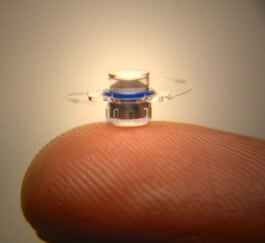Macular Degeneration Treatment in San Diego
AMD Telescope Implant in La Jolla, Escondido & Mission Hills
When the macula does not function correctly, you can experience blurring or darkness in the center of your vision. Although Macular Degeneration reduces vision in the central part of the retina, it does not affect the eye’s side or peripheral vision. For example, you could see a clock but not be able to tell what time it is. In some cases, laser treatment can be done to prevent or lessen severe loss of eyesight due to Macular Degeneration.
If you suspect you have Macular Degeneration, please make an appointment for a comprehensive eye examination.
What is AMD?
Age-related macular degeneration (AMD) is a disease of the retina. End-Stage AMD is the most advanced form of the disease and the leading cause of irreversible vision loss and legal blindness in individuals over the age of 65.
In early, less advanced AMD, visual symptoms are generally mild and may or may not impact vision-related activities. However, advanced stages of AMD can result in severe loss of sight in the central part of vision. This is often referred to as a central vision “blind spot.” This blind spot is different than the visual disturbances experienced with cataracts (clouding of the eye’s lens) and is not correctable by cataract surgery or eyeglasses. Side vision, or peripheral vision, is not affected by AMD, but is too low resolution to make up for lost central vision. At this time, there is no cure for End-Stage AMD and no way to reverse its effects.
What is CentraSight® & the Telescope Implant?

The CentraSight treatment program uses a tiny telescope, an FDA-approved medical device, which is implanted inside the eye to improve vision and quality of life for individuals affected by End-Stage AMD.
The telescope implant, about the size of a pea, is intended to improve distance and near vision in people who have lost central vision in both eyes because of End-Stage AMD. The telescope implant is surgically placed inside one eye. The implanted eye provides central vision; the other eye provides peripheral vision.
The telescope implant is not a cure for End-Stage AMD. It will not restore your vision to the level it was before you had AMD, and it will not completely correct your vision loss. Patients with this level of AMD have had to cease driving due to their vision; after the telescope procedure, although near and distance vision may improve, driving will not be possible because the implant does not restore normal vision.
Am I a Candidate?
In general, to be considered a potential candidate for the telescope implant an ophthalmologist must first confirm that you:
- Have irreversible, End-Stage AMD resulting from either dry or wet AMD
- Are no longer a candidate for drug treatment of your AMD
- Have not had cataract surgery in the eye in which the telescope will be implanted
- Meet age, vision, and cornea health requirements
After the ophthalmologist confirms that you are a potential candidate, your vision will be tested using an external telescope simulator. The results of the test and visual training/rehabilitation evaluation visits will help you and your ophthalmologist decide if you are likely to benefit from the CentraSight treatment program. If so, the tests will also help you and your ophthalmologist discuss which eye should be treated and what your vision may be like after the treatment.
Contact us today to see if this procedure is right for you.








